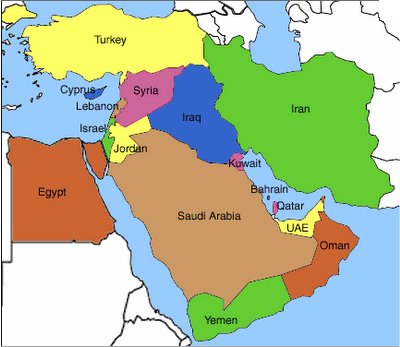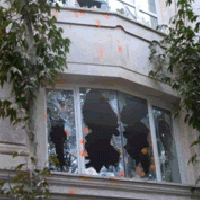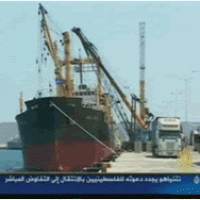![]()
Sun, Aug 22, 2010 | The Rubin Report | By Barry Rubin
Iraq and the Real Middle East Conflict
Aymenn Jawad Al-Tamimi is a talented young Arab writer who shows how to analyze regional politics well. His short article on Iraqi politics and how they fit into the Nationalist-Islamist, Iran-Syria-Turkey bloc versus Arab regimes’ conflict really makes the issues clear. Recommended reading.
Basically, he shows how Saudi Arabia and Iran are competing for influence in Iraq just as the Saudis were battling with Iran and Syria in Lebanon but gave it up as a lost cause. Meanwhile, the United States and Europe are acting clueless about this huge struggle in the region that will determine its future. The central issue is not Israeli-Palestinian or even, in a sense, Iranian nuclear. It is the massive conflict between two blocs.
One of them is composed of Iran, Syria, the Turkish regime, Hamas, Hizballah, and the Iraqi insurgents. The other consists of all of the Arab regimes except for Syria and the Lebanese March 14 coalition. There are some forces, like Qatar, that play on both sides at times.
The revolutionaries have Islamist ideology and both financial and terrorist backing from Tehran and Damascus. The relative moderates–whose interests in some ways parallel those of Israel and in most ways the West–are hoping for Western backing. Poor relative moderates to depend on such unreliable patrons.
The West continues to see the region largely in terms of the outmoded Arab-Israeli conflict when there is a battle to the death among Arabs and among Muslims going on in front of its eyes. It is often more concerned with engaging or apologizing for the radicals than it is in helping the relative moderates against them.
Here’s an excerpt from Aymenn Jawad Al-Tamimi’s article:
This new Cold War represents the current ideological division in the Middle East between the “revolutionary bloc,” led chiefly by Iran, Syria, and more recently Turkey, and the “status-quo bloc,” led by Saudi Arabia and Egypt. While most Sunni Arab states align themselves with the “status-quo bloc,” there are notable exceptions in that Qatar and Oman back the “revolutionary bloc,” while Libya simply sits on the sidelines.
The Middle Eastern Cold War has manifested itself in recent years in several ways, including the ongoing tension in Lebanon between Saad Hariri’s coalition government and pro-Syrian factions like Hezb’allah, the contest between Fatah and Hamas for the Palestinian leadership, and the conflict in Yemen between Iranian-backed Shi’a Houthi rebels and the Saudi-backed central government of Ali Abdullah Saleh.
However, the most recent sign of this Cold War could well lie in Iraq as Saudi Arabia and Iran jostle for influence…it is possible that Iraq will emerge as a sort of theatre of proxy warfare between Saudi Arabia and Iran in the near future. Nevertheless, it is improbable that the struggle will be prolonged, as Iran, the leader of the “revolutionary bloc,” and most of the Shi’a population of Iraq share the goal of ensuring Shi’a dominance in the country, such that Iraq, under a Shi’a-led government, will likely become an auxiliary for the “revolutionary bloc.” This outcome becomes much more conceivable when one considers that Iran could well have nuclear weapons in the next few years, which will make it much harder for its rivals to contain Iranian influence in Iraq.
Read more here.
About the author,
Barry Rubin is director of the Global Research in International Affairs (GLORIA) Center and editor of the Middle East Review of International Affairs (MERIA) Journal. His latest books are The Israel-Arab Reader (seventh edition), The Long War for Freedom: The Arab Struggle for Democracy in the Middle East (Wiley), and The Truth About Syria (Palgrave-Macmillan). For the website of the GLORIA Center go here and for his blog, Rubin Reports, go here.



 RSS
RSS











The Real Middle Eastern Cold War #iraq #iran #war #islam http://j.mp/9mWPeR
RT @CrethiPlethi: The Real Middle Eastern Cold War #iraq #iran #war #islam http://j.mp/9mWPeR